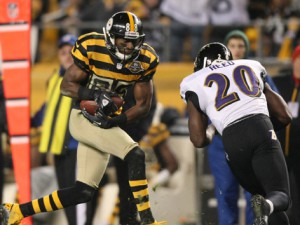
Baltimore safety Ed Reed's head-to-head hit on Pittsburgh receiver Emmanuel Sanders has stirred controversy around the league. (Jason Bridge-US PRESSWIRE)
Consider me someone that is very confused. It also wouldn’t surprise me if Ray Anderson, the NFL’s executive vice president of football operations, is a bit confused, too.
You see, it was Anderson that put his words on record when the league moved quickly on Monday to suspend Baltimore Ravens safety Ed Reed for one game without pay after his hit on Pittsburgh Steelers wide receiver Emmanuel Sanders in a game the night before.
While the suspension was imposed by Merton Hanks, the NFL’s vice president of football operations, it was Anderson that was quoted in the league release.
“We cannot tolerate repeated violations of rules, especially rules related to player safety,” Anderson said. “We will continue to take the strongest possible action to deter these types of violations and protect our players.”
Earlier this season, Reed was fined $21,000 for hitting former Patriots wide receiver Deion Branch in the head and neck area when he was considered to be a defenseless player.
In 2010, Reed was fined $10,000 for a hit on New Orleans Saints quarterback Drew Brees. On each play, including the one against the Steelers, Reed was penalized.
Anderson went into more depth when he appeared on ESPN Radio to explain the decision.
First, in describing Reed’s actions, Anderson said, “We want him to hit below the head and neck area. We’d like to see him use his shoulder. We’d like to see him wrap up in a more traditional technique. But we absolutely do not want to see head-to-head, shoulder, forearm to head or neck area, no real attempt to wrap, and almost going missile-like up high. We cannot have those in the game any longer.”
Because of the previous fines, Reed was deemed a repeat offender. Anderson said, “We put the burden on the defender to alter his target in those situations when a player is defenseless.”
The strongest words from Anderson were these: “Hits to the head and neck area potentially are life altering as well as career altering. Hits to the head and neck area are our biggest concern and we are absolutely intent on getting those out of the game. We can’t defer any longer to fines as the primary deterrent. They are not effective.”
Apparently, Ted Cottrell didn’t receive that memo. Cottrell, along with Art Shell, are the hearing officers agreed to by the NFL and NFLPA that listen to appeals.
An expedited appeal was heard by Cottrell Tuesday, and he inexplicably stopped the suspension and instead fined Reed $50,000.
Cottrell wrote to Reed, “I have determined that your actions were egregious and warrant significant discipline. However, I do not believe that your actions were so egregious as to subject you to a one-game suspension without pay. Player safety is the league’s primary concern in the formation of playing rules and all players are expected to adhere to those rules or face disciplinary action. I hope in the future you will focus on ensuring that your play conforms to the rules.”
It seems clear Cottrell simply ignored the fact that Reed is a repeat offender by stating this particular hit wasn’t egregious enough to warrant a suspension. Egregious is a strong word, and Cottrell agreed the hit was egregious but not egregious enough. Beyond that, however, is that it should have been viewed in the context of him being a repeat offender, including one earlier this season, but it wasn’t.
To say his actions warranted “significant discipline” and then reach the conclusion he did makes little sense. Reed’s salary this season is $7.2 million and had he been suspended, he would have lost over $423,000. Instead, his fine of $50,000 is less than 1 percent of his salary.
Also somewhat troubling is that the NFLPA announced it was appealing the suspension, and stoked the fire by stating, “The NFLPA will always work to ensure that the interests and rights of NFL players are protected.”
But, what of the players that were hit by Reed?
Meanwhile, after the decision by Cottrell, Ravens general manager Ozzie Newsome noted that Cottrell was “a long-time NFL defensive coach.” Left unsaid is that Hanks was a long-time NFL defensive player.
Newsome also said in a statement, “I think John (Harbaugh) and his coaches do an excellent job of teaching the right, safe and legal way to play football, and we believe Ed clearly tries to play within the rules on every down.”
How about damning with faint praise? Reed “tries to play within the rules on every down?”
Good for him. Unfortunately, trying isn’t enough. Doing it consistently is what the NFL wants. After all, there are numerous players that find a way to do that and not get fined three times in three seasons.
Cottrell dropped the ball on this one, sending a message to players that there really won’t be serious consequences if they repeatedly break those rules.
Suh Speaks with Forked Tongue
A minor war of words occurred this week prior to the Lions’ Thanksgiving Day game against the Houston Texans. The subject was Texans defensive end J.J. Watt and his penchant for knocking down passes.
Suh said, “It’s not our focus here. We get after the quarterback. In my opinion, when you are batting down balls you are not getting to the quarterback. You are standing still and not near the quarterback enough to hit him; that’s why you bat the ball down.”
Suh had one pass deflection entering the game to go with 4.5 sacks. He concluded, “That’s about where I like that. I’d rather have more sacks than batted passes.”
Perhaps Suh didn’t know the Texans had 27 sacks and the Lions 23. Plus, Watt, who had 11 deflected passes, also had 11.5 sacks.
Taking Heat
Patriots coach Bill Belichick took some heat for having tight end Rob Gronkowski on the field for an extra point that was the team’s final point in Sunday’s 59-24 win over Indianapolis. On the play, Gronkowski suffered a broken forearm and is expected to miss 4-8 weeks.
Never mind that eight other players were also on the field (aside from the kicker and holder) and that surely there were one or two starting offensive linemen on the field.
Belichick was pragmatic when asked about it the next day.
He said, “We’ve seen those games in the NFL every year, teams that have a lead — you can go back to the Indianapolis-Tampa game when they scored like 24 points in four minutes. The Buffalo-Houston playoff game where it’s 35-0 at halftime and you lose 38-35, whatever it was. It doesn’t take much in this league. Teams can score quickly. Turnovers. I think you just keep playing. At some point, there is a point (but) then you only have so many players, so somebody has to play.
“I think you have to be careful when you are trying to run a team to go up to one guy and say, ‘Michael, we’re going to leave you in the game because we don’t really care about you, but Glenn, we’re going to take you out because you’re really important.’ I don’t think that’s really a good way to approach a team. I’ve never done that. I don’t think that would be a very successful approach to it.”
Belichick concluded, “Football players play football. You tell me which guys are going to get hurt and I’ll get them out of there.”
The Quote
San Francisco tight end Vernon Davis on a 32-yard pass from quarterback Colin Kaepernick against the Bears Nov. 19: “The ball he threw to me; it was one of those balls Tom Brady throws. Second window, right on the money. … He saw it and he put it in there.”

